The second edition of the Autumn School of Curating, titled NEW NOW, took place last year between November 20-30 in a set-up adapted to the current global situation (i.e. online), offering an intense and complex program through Facebook livestreams and Zoom discussions. This international project was started in 2019 by the Cluj Cultural Centre, through the European Centre for Contemporary Art (ECCA), in partnership with the Art Encounters Foundation Timișoara, with the goal of consolidating learning about curatorial practices through collaborations with professionals in the field that would contribute to its development.
Two of the seminar’s ten days were dedicated to public conferences livestreamed on social media, held by the course leader Adrian Notz (CH) and coordinated by Georgiana Buț (ECCA) and Diana Marincu (Art Encounters), together with the guest artists and curators: Heba Y Amin (AE), Carlos Amorales (MX), Zheng Bo (CN), Ibrahim Nehme (LB), Joanna Warsza (PL/DE), Tara Lasrado (AU/IN/CH). These were followed by six days of individual presentations by the participants and discussions focused on the theme of NEW NOW, ending in a public livestream on Facebook showcasing the end result of all the intense work that went into the course, materialized in a website/manifesto: https://new-now.art/.
The participants were selected following an international open call, most being young professionals in the field of visual art (curators, artists, art critics, cultural managers): Ann Mbuti (CH), Christopher Michael Gutierrez B. (USA), Colette Downing (UK), Cristina Bută (RO), Cristina Stoenescu (RO), Edith Lazăr (RO), Georgiana Toea (RO), Iulia Marcu (RO), Juan Fernando Duque Restrepo (BE), Karolina Aleiferopoulou Mackiewicz (EL), Ungvári-Zrínyi Kata (RO), Katarina Bogataj (SI), Kaur Chimuk (IN), Monica Dănilă (RO), Rula Dughman (PS), Sadya Mizan (BD), Ruth Borgfjord (RO), Tatiana-Laura Moise (RO), Tereza Nováková (CZ), Veronika Shuster (UA).
Compared to the course’s first iteration, Making Conversation Pieces (2019), whose main goal was to familiarize the participants with and introduce them to various cultural institutions in Cluj Napoca and Timișoara and to their representatives, the dynamics and theme of the second edition were conceived with the current situation as a conceptual starting point: this bizarre, uncertain present which we attempt to survive, both as people and as professionals. Course leader Adrian Notz had an ambitious and engaging project: to curate information and knowledge in an online course/workshop, conceived as the virtual meeting of multiple professionals in various parts of the world, structured around a few central coordinates pertaining to the concept of NEW NOW and the attempts to understand and perhaps define it. He made the idea of unlearning into a kind of leitmotif throughout the Zoom sessions, problematizing the concept of time, its relativity, and the ontological transformations resulting from the relation between humans and technology, translated as a loss of the memory of the past and the future in a dark age of informational inflation. Together with his guests, Adrian Notz questioned the role of the curator, but also that of the artist, the status of these professions, and their relevance in a present where art survives more or less on the fringes in the context of a pandemic crisis.
In the first days of the curatorial school, the invited artists and curators introduced themselves and their art practice or curatorial practice, while the participants following the livestream had the chance to interact with them, to ask them questions, thereby contributing together, directly or indirectly, to an attempt at describing this fluid notion of NEW NOW. Artist Heba Y Amin’s talk was titled Female Subjectivities and Technological Dystopias, in fact an analysis of her research project OPERATION SUNKEN SEA and a reference to techno-utopian visions in the early 20th century. The project looks at the transformations of territorial constructs in Africa and the Middle East and at their impact on new geopolitical alliances and global politics.

Heba Y Amin_”Female Subjectivities and Technological Dystopias” presentation
Carlos Amorales problematized the artist’s status in the pandemic and lockdown context in his talk The Happy Uselessness of the Artist, talking about how he adapted a personal project for the Michoacán Biennial and to a new perspective on art production in relation to activism. Zheng Bo, currently on a residency at Martin-Gropius-Bau Berlin, showcased, in his talk Dao is in Weeds, an erotic view on the relation between the human and plant body, interpreted as a return to nature through stop-motion and ecosexual film. Ibrahim Nehme, in The Possibility of Possibility, analyzed the process of his and his team’s work on The Outpost magazine, which, in serialized form, developed an identity theme (both individual and collective) in the Arab world. Curator Joanna Warsza, in her talk titled You will never walk alone. A curatorial presentation by Joanna Warsza in the form of a stroll, took the participants out of their private space and into the public through an action that involved taking a walk with their camera off and then, each participant in turn, describing their surroundings so that everyone else could get a mental image without a visual reference. Joanna Warsza aimed for a kind of communication and knowledge beyond the limits of physical space, using as her title one of the slogans chanted at the recent women’s rights protests in Poland (You will never walk alone). Tara Lasrado, in her Landscapes of (un)learning – on ecology, care and community, investigated one of her main preoccupations: the deterioration of natural ecosystems on a global scale, problematizing it through collaborative transdisciplinary projects, like ecologyx and under the mango tree (involving artists, scientists, and local communities in the process of preserving and restoring these ecosystems).

Zheng Bo_ “Dao is in Weeds” presentation
The most intensive period of the curating school was the six days of individual presentations by the participants, led by Adrian Notz, in which each showcased their activity: their main curatorial or artistic projects, research, and personal interests – inevitably correlated with the cultural, social, and political situation of their region of origin. Besides the learning that came out of this process of getting to know each other, the discussions and exchanges generated by the presentations outlined a common action, creating narrative and poetic content for an online platform, starting from the complex present in which we reconfigure our individual and collective identity, with the radicality of a manifesto as a guiding point.
video: Tatiana Moise @anavailable
Notz invited the participants to each draft a manifesto about the NEW NOW, filtered through their own vision, both conceptually and aesthetically, encouraging the performative aspect of their contribution. The idea of radical action as a digital insert/intruder into the online matrix is inspired from the 20th century Dada manifesto, partly qualifying as an avant-garde performance. Adrian Notz has worked in the Cabaret Voltaire in Zürich – one of the early centers where the Dada movement developed – starting in 2004 as assistant curator, between 2006 and 2012 as co-director, and between 2012 and 2019 as director, organizing numerous exhibitions, events, and actions, with international artists, performers, and activists. By allowing for a subtle analogy between the historical moment in which Dadaism appeared (during the First World War) and NEW NOW (the present global crisis) – Notz tackles passivity, solidarity, and anarchy (and their interdependence on each other) as potential social and cultural functions integrated into a paradoxical and volatile “now,” marked at the same time by panic and hedonism. This analogy materializes through the possibility of human extinction, dissolving the meaning of the present and putting the future in an uncertain light. Artists and cultural producers are engaged in the present, as the projection of the future becomes inconsistent, at times absurd, while art-making becomes a revolt through experiment. Adrian Notz connects the avant-garde concept of the end of history with his concern for an end of future, which could concretize this NEW NOW as similar to the “new art” envisioned by early 20th century avant-garde artists.

Adrian Notz_DADA presentation during seminars
Confronting death reasserts existence, one that is more intense and anchored in the real life of people struggling in a precarious society. Both in Dada and in NEW NOW, the new cultural values reinterpret and reconfigure previous conceptions, with the goal of an art production that pertains just to the present moment and to immediate reception, without taking into account its historical influences projected in time. Ethics and morals are no longer mandatory in the act of artistic creation and are no longer the solid principle underpinning a work, while happenstance, chance, and experimentation become key elements. What NEW NOW develops as its defining feature is its note radical softness, which emerges from the participants’ informational input in constructing the manifesto, marked by personal histories and experience. Furthermore, the physical distance, the impossibility of meeting in real life, and the condition of captive/confined body (Joanna Warsza analyzes the notion of body in confinement in her presentation of her project Die Balkone) slowly introduced a certain affectivity, emotion, and empathy within the working process, throughout the Zoom meetings, refreshing the historically sanctioned view of the radicality of manifestos.
Adrian Notz’s meetings with the participants of the Autumn School of Curating were determined by the intriguing relation between presence and absence, directed towards creating a complex final product in the form of an online platform, https://new-now.art/, a living confrontation and a sensitive revolt in the face of an obscure and uncertain future. The website documents the artists’ and curators’ presentations, as well as the contributions of all participants in the form of personalized playing cards bearing figures of heroes, models, ideas, methods, and concepts, opening up into the vastity of NEW NOW – starting from word, image, and action. Lera Kelemen took care of its design, and Georgia Țidorescu and Roxana Ajder took care of the distribution and structuring of the information.

Adrian Notz_website presentation https://new-now.art/
In elaborating the theme for the second edition of the Autumn School of Curating, Adrian Notz started with an image of Kerim Seller’s work NEW NOW (2017). Together with the course participants, guests, and coordinators who contributed to the NEW NOW movement/manifesto, Notz managed to open a doorway within the online world through which information exchange could finally become a means of authentic interhuman closeness, a starting point in establishing long-term contacts and professional connections. In these times of social crisis, the word empathy has sometimes become redundant and clichéd, but in the context of the NEW NOW Autumn School of Curating, the meaning of empathy did not lose its strength; on the contrary, it became living, real, almost palpable. Beyond the curating of the information and the performative character of a radical manifesto, NEW NOW’s contribution lies in meaning, motivation, and the hope to carry on, in spite of a context that is problematic and unfavorable for cultural work. The mental and emotional proximity between people with the purpose of producing a profoundly existential action creates a fruitful context for questioning certain paradigms, encourages the transgression of certain limits and a new understanding of reality, offering a new meaning: a NEW NOW.
The NEW NOW Autumn School of Curating’s public talks can be viewed online:
Day 1: https://www.facebook.com/timisoaraartencounters/videos/404436940731533
Day 2: https://www.facebook.com/timisoaraartencounters/videos/671007086895512
Final talk: https://www.facebook.com/timisoaraartencounters/videos/388316878891573
Translated by Rareș Grozea
POSTED BY
Ada Muntean
Ada is a Graduate of University of Art and Design in Cluj-Napoca and has a PhD in Visual Arts (2019), conceiving a research thesis entitled "The Human Body as Image and Instrument in Contemporary Art....
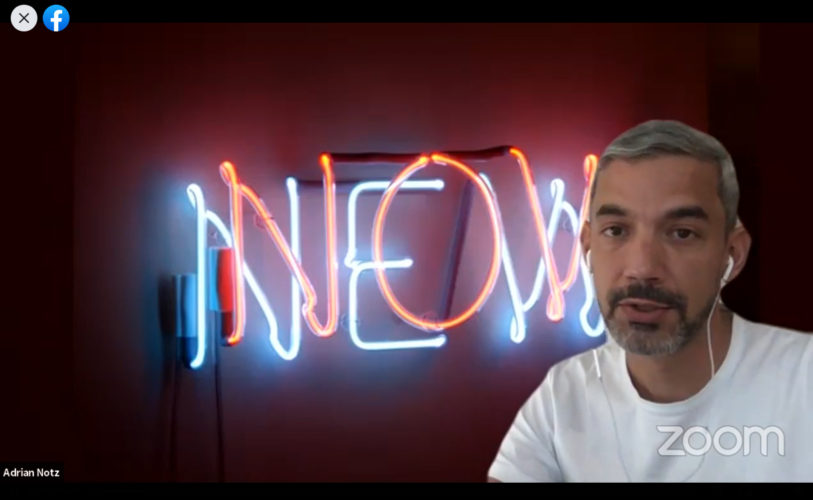

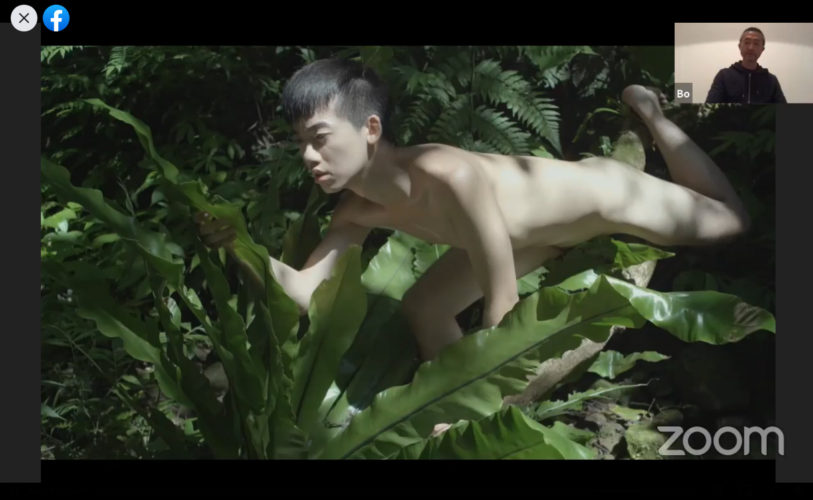


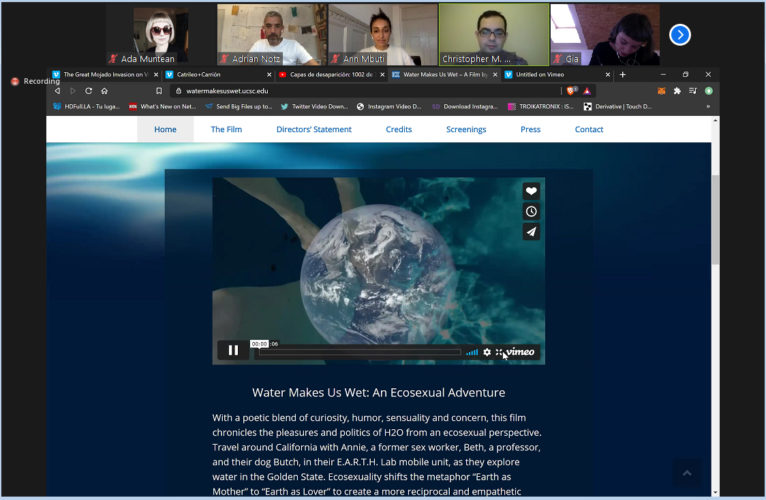
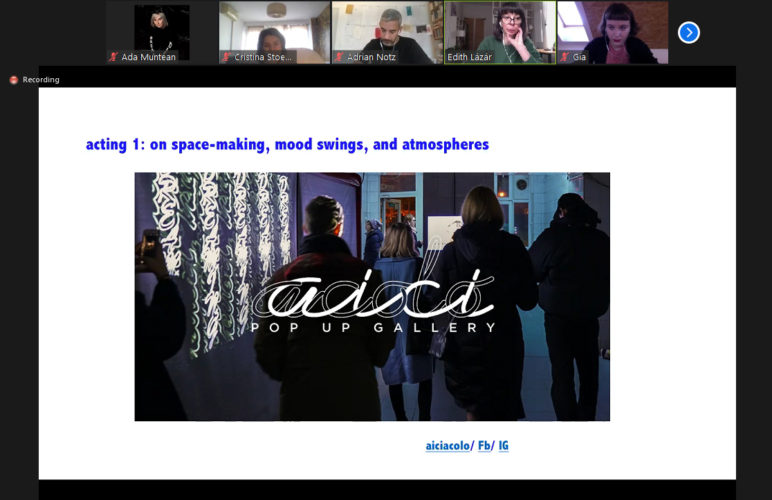
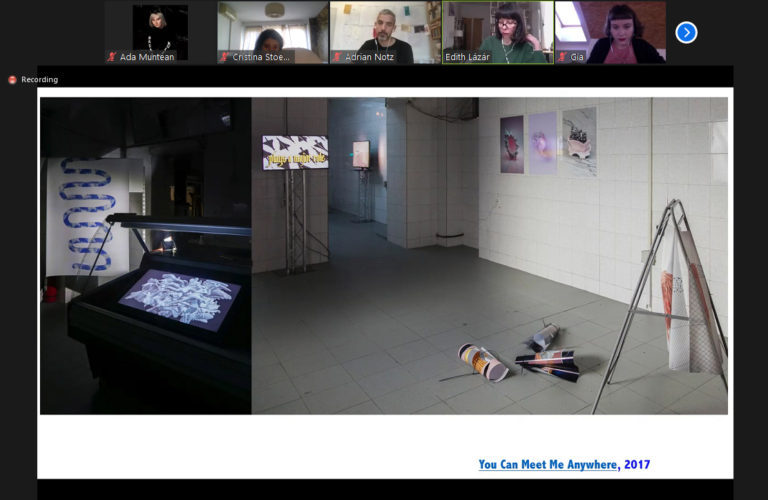

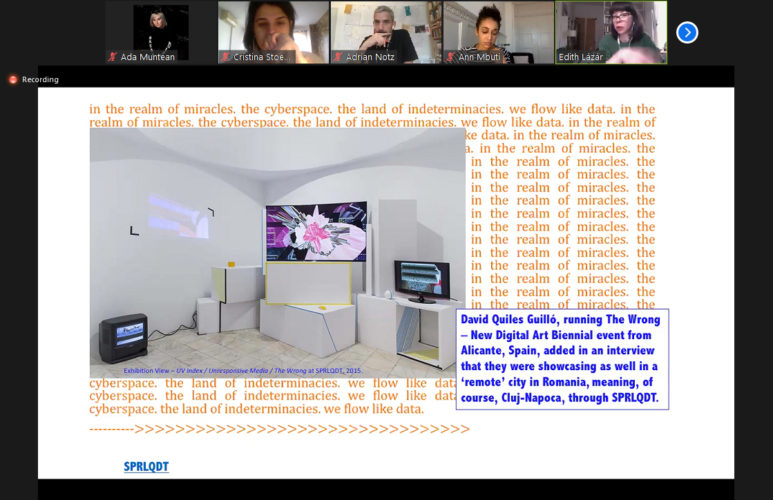


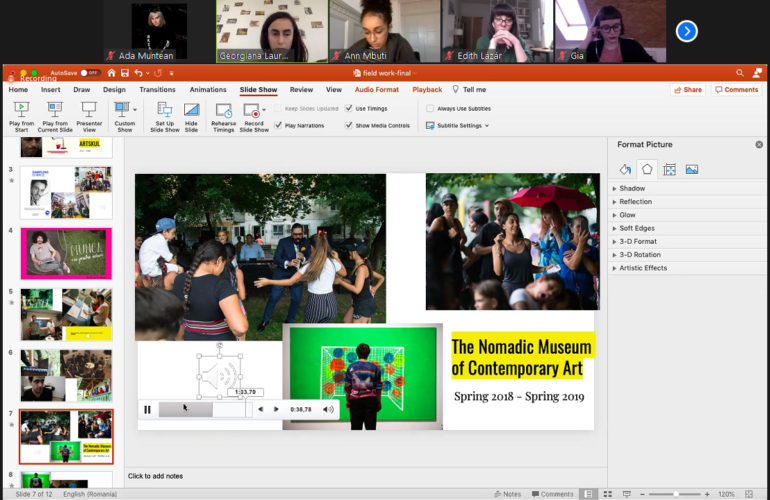

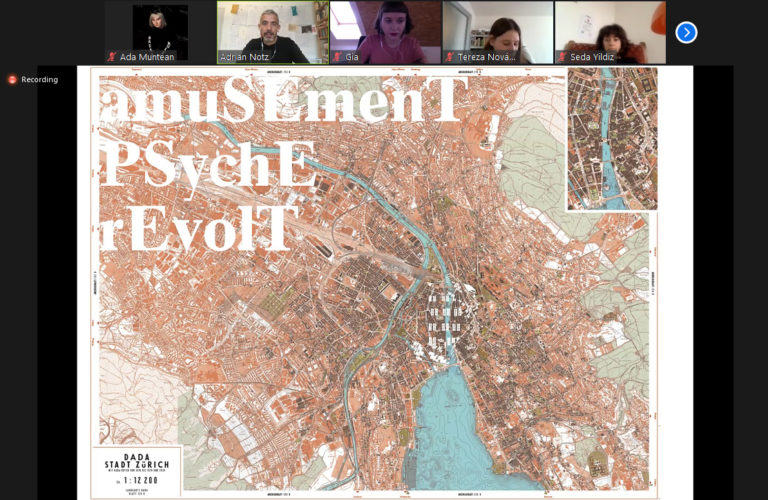
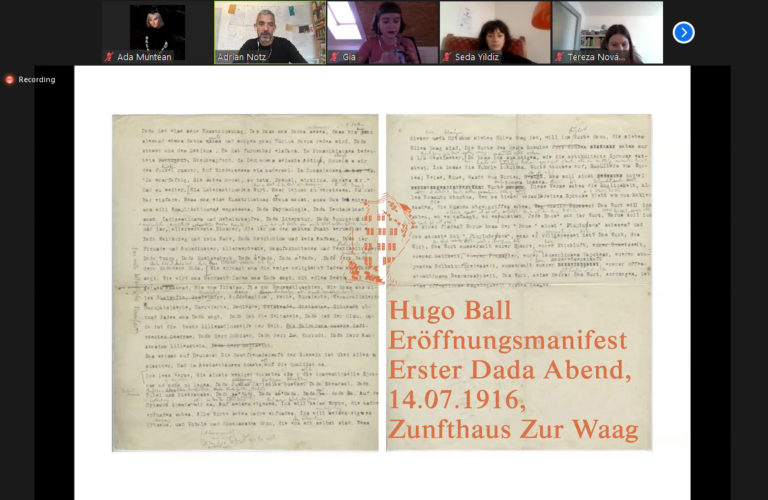

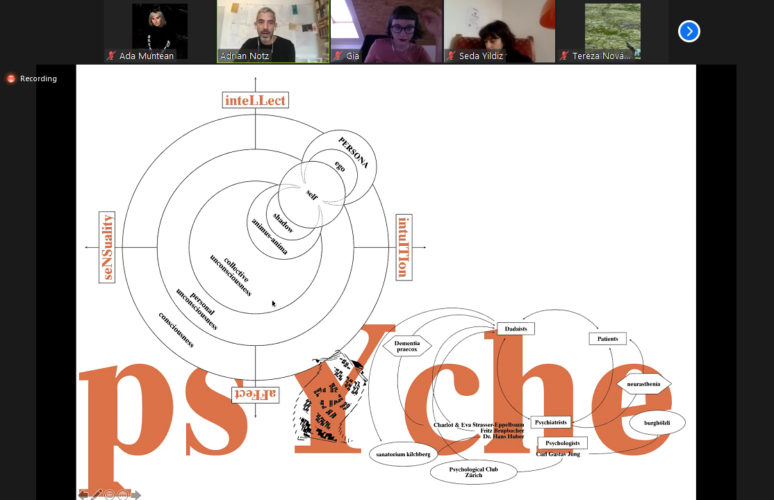


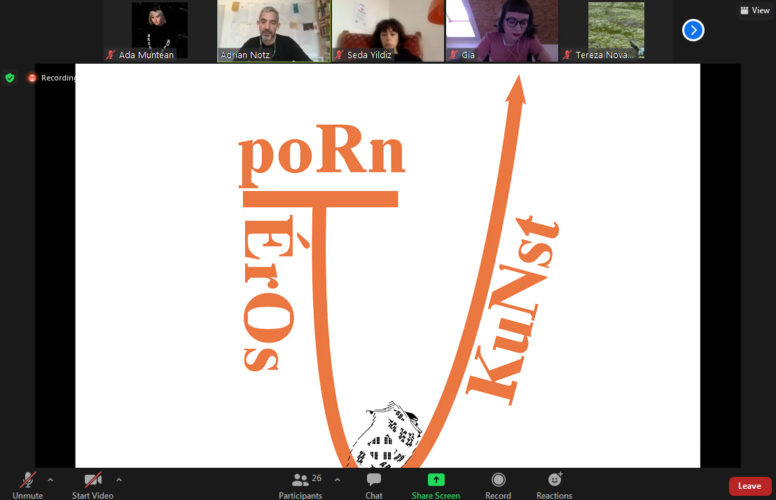

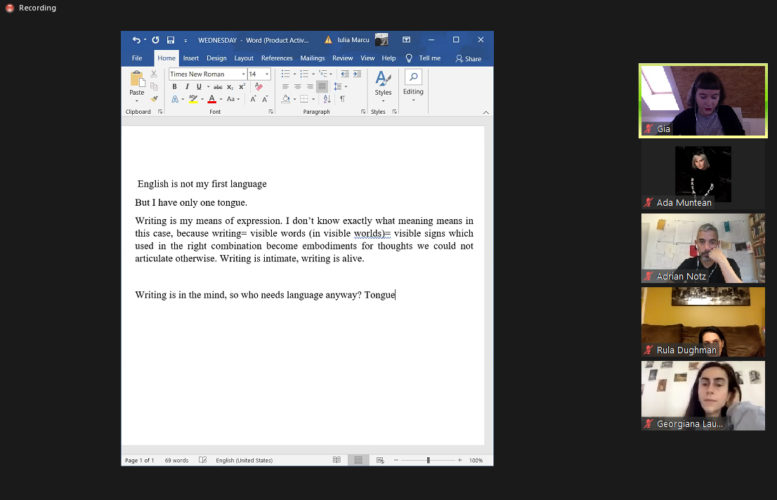
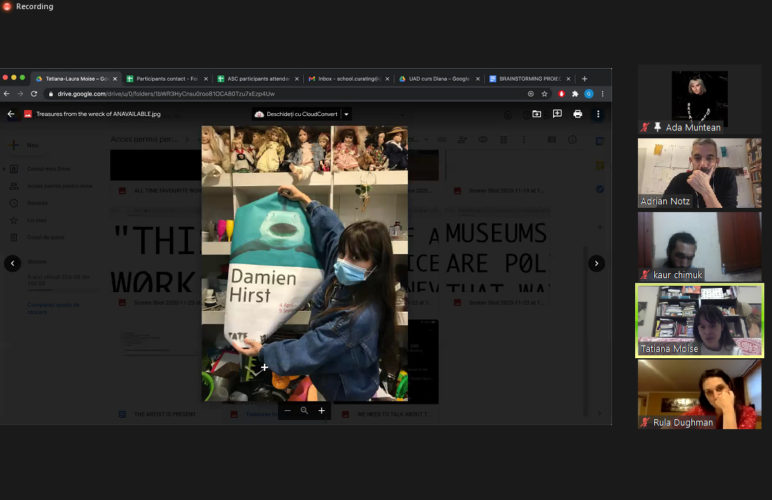

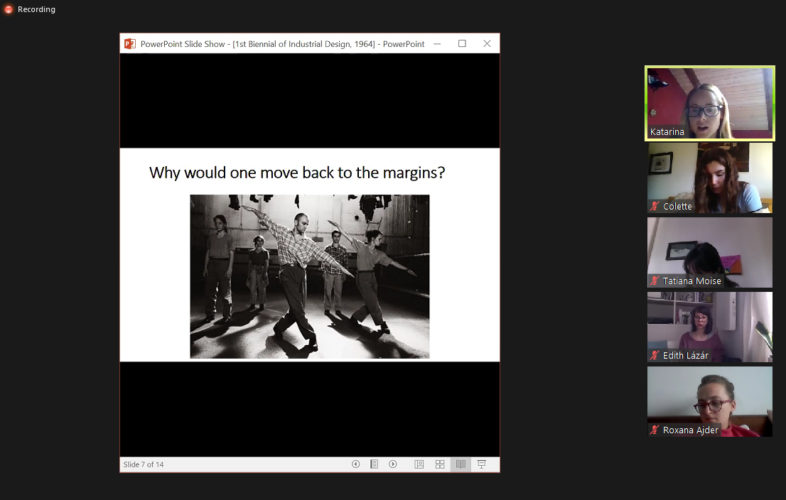

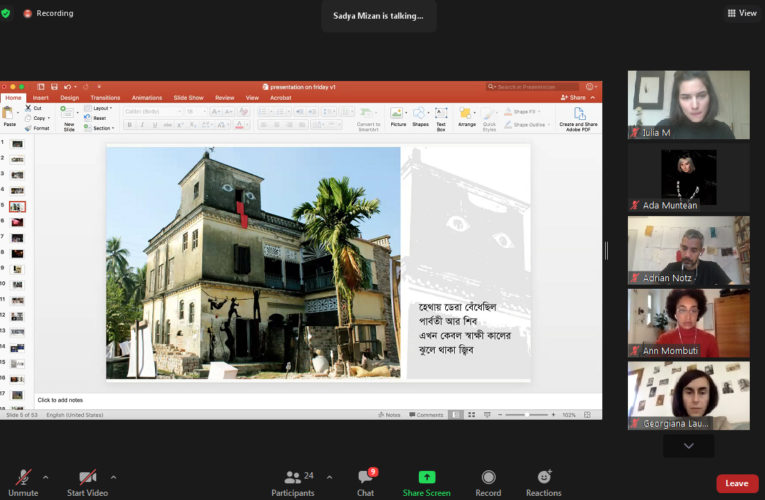

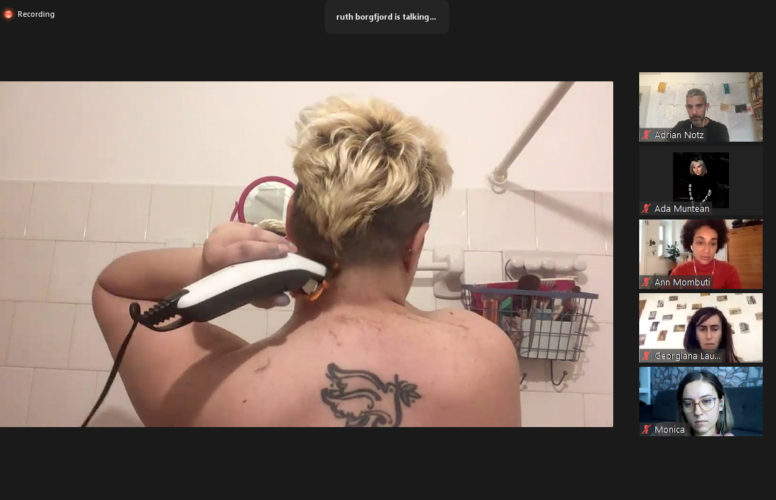
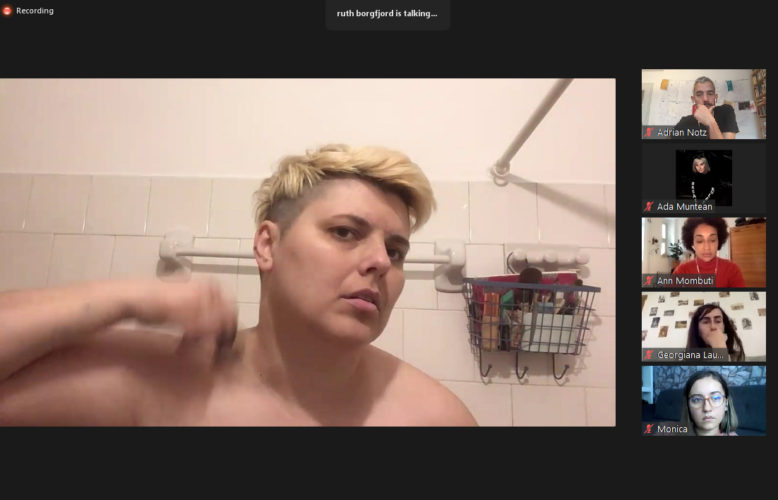


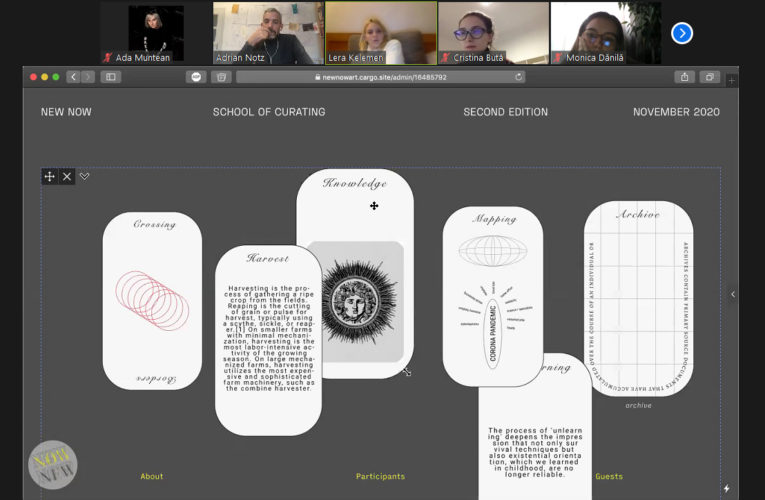
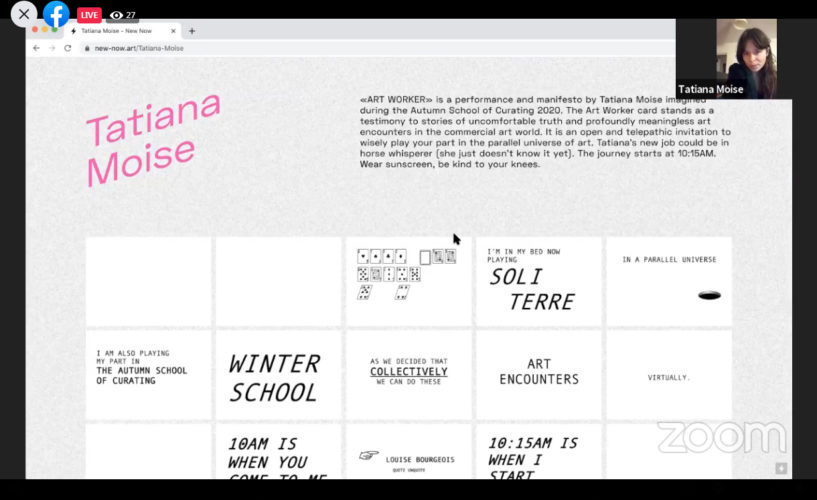


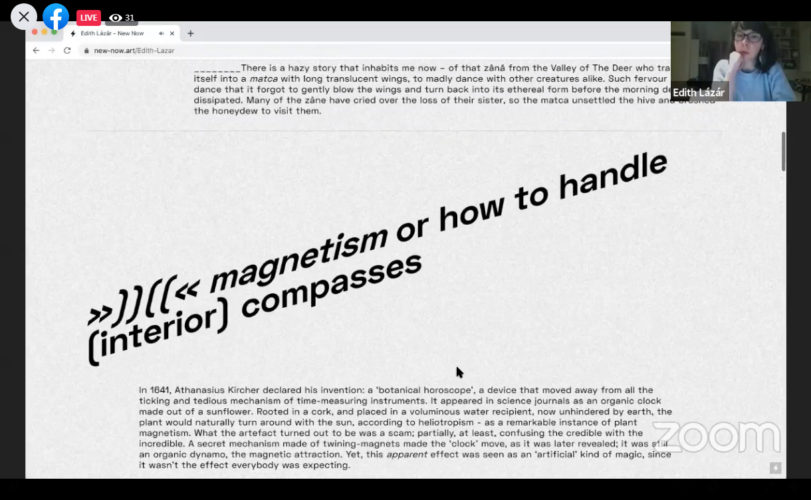
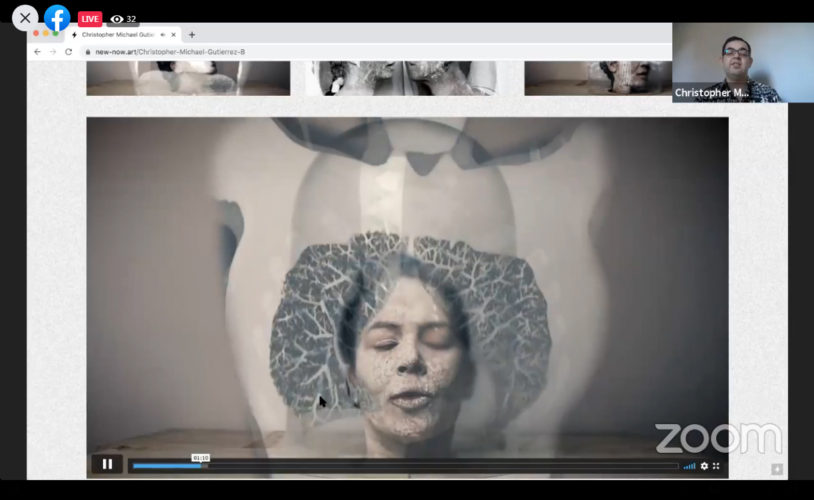
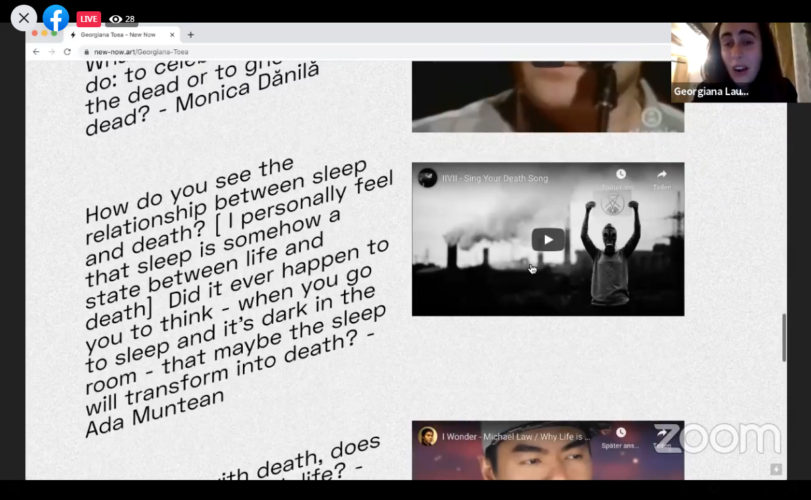

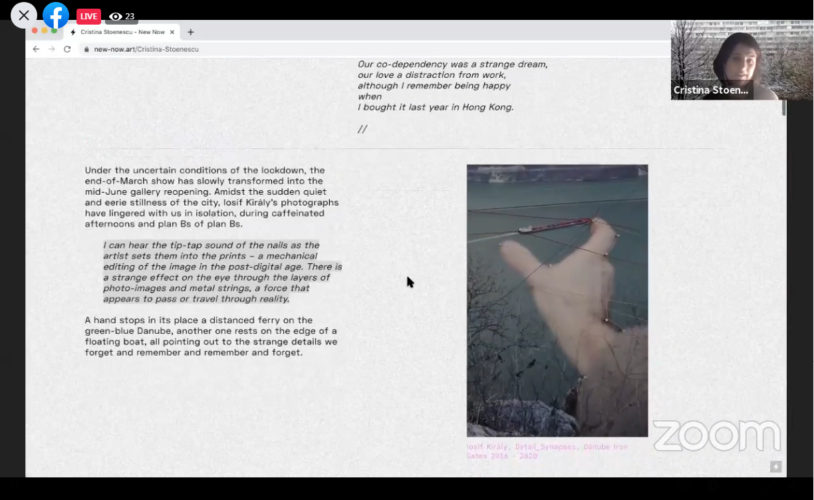

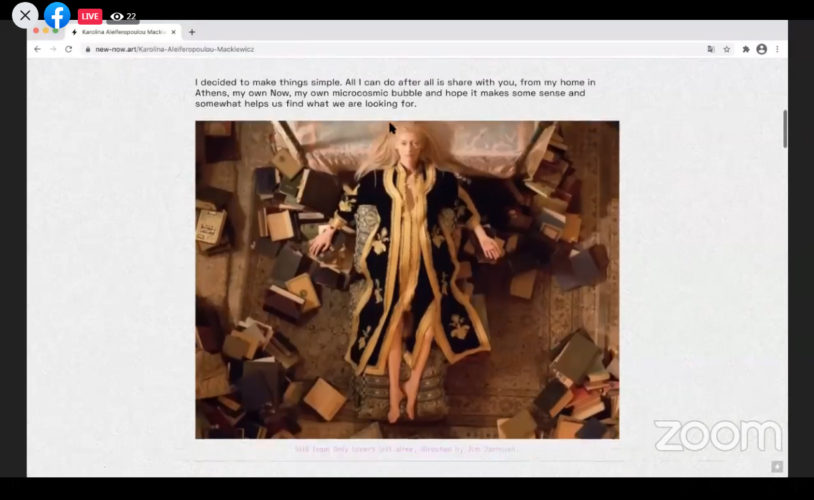
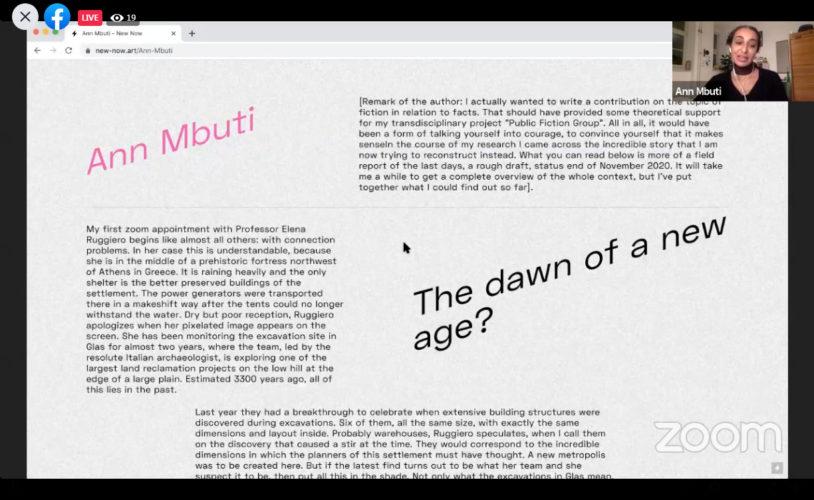
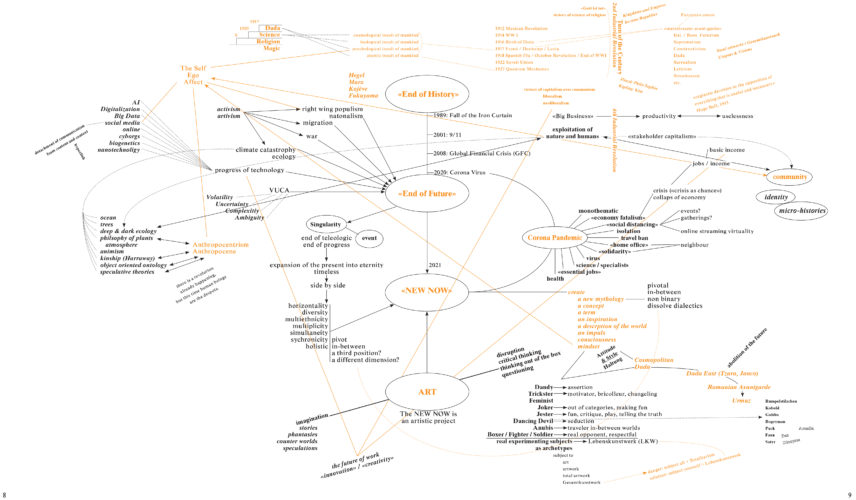
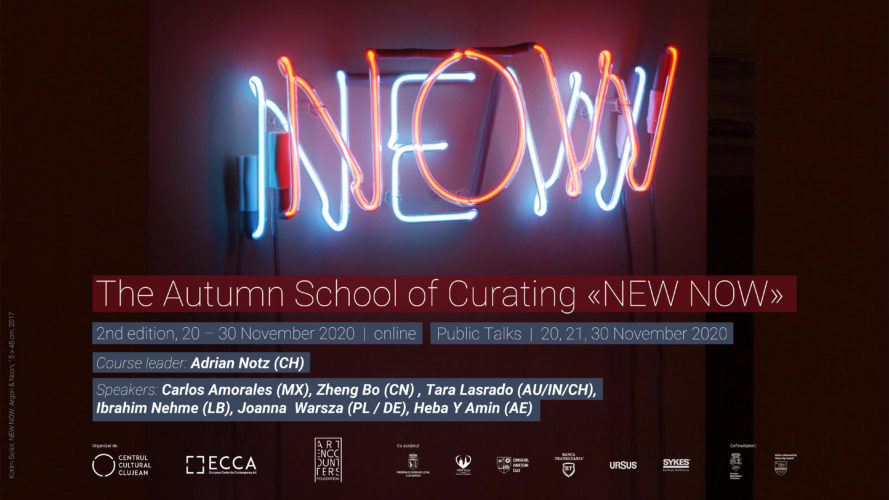
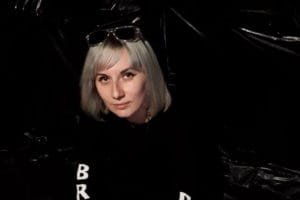
Comments are closed here.